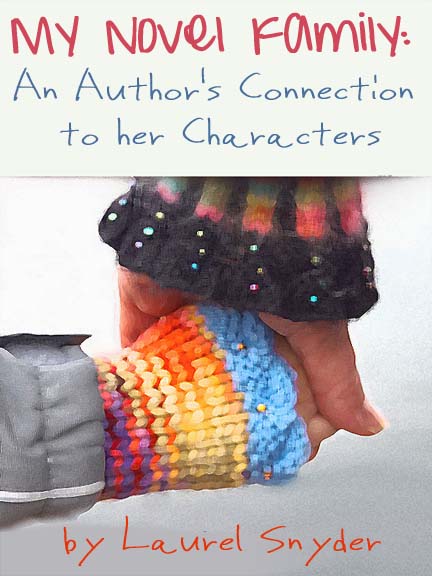My Novel Family: an Author’s Connection to her Characters

I am so excited to celebrate the release of Laurel Snyder’s new book, “Seven Stories Up” (Random House Children’s Books 1.28.14). This book will reconfirm your belief of magic in the world as Laurel’s characters make their way into your heart.
Here, Laurel shares her inspiration for and challenges of writing “Seven Stories Up”. ~ Beth
![]()
When I set out to write Seven Stories Up, I had several goals in mind. On a personal level, I wanted to write about my grandmother, who had just passed away. I wanted to explore what her life (as a quarantined invalid during the Depression) might have been like if she’d had a best friend in those years, someone to make her feel less alone. This thought was the catalyst for the book, the seed planted before I ever began writing.
But I had another goal for the book too, and in some ways it was the greater challenge for me as a writer.
Seven Stories Up is a companion novel, and when I actually sat down to write the book, it was my previous title, Bigger than a Bread Box, I was thinking about. In Bigger than a Bread Box, I followed a girl named Rebecca through a hard autumn of her life, as her parents—Annie and Jim—were separating.
Rebecca’s story was based on my own childhood memories, but it was a fiction, in which a mother (Annie) has taken her kids and run off with them to Atlanta, leaving “Dad” back home in Baltimore. This was certainly not something my own mother ever did, and it was an action I struggled to comprehend, even as I wrote it. As a mom, I didn’t think could never do such a thing to my kids.
Which left me with a very real question—what kind of mother would? As someone who doesn’t often write villains, or much believe in their simplicity, I wanted to know what kind of personality quirks and childhood experiences might make a mother capable of such a rash, independent decision.
And so I had to work backwards. I had to reverse-engineer my main character, Annie. Whoever she was as a kid, she had to grow up to be someone who might reject—if only briefly—the idea that a kid might need two present parents. Annie had to be someone impetuous when pushed to the brink. She had to be someone striving for more, unwilling to settle. Why—I wondered—would she move from Atlanta to Baltimore in the first place?
And this was how the book began, backwards!
I followed Annie back in time, from motherhood to childhood. I stalked her back to Atlanta, to her own twelfth year, a year that changed her, magically, just as the Bread Box had changed Rebecca. I discovered that Annie was loving, but sometimes brusque and selfish. That she’d grown up with a great mom herself, but a mom who had a hard time handling tricky emotional terrain. I discovered that she’d grown up without a father. I discovered that there was a very real reason Baltimore might someday draw her north from her home in Georgia.
The more I discovered, the more the book became a labyrinth. I had to construct this new world of Seven Stories Up without pulling apart the world I’d written into Bigger than a Bread Box. All while observing the logic of my time-travel storyline, and the historical requirements of 1937. It was a fascinating process, but it took two years longer than expected. It was HARD.
In the end it was worth it. Not only do I know Annie much better than I did when I finished writing Bigger than a Bread Box, I understand Rebecca better too. Families are so complex—so layered and interwoven. I feel like I’ve spent the last five years now with the Jaffin/Shapiro clan. I feel like I’m part of the family.
It’s been interesting for me, to see how people respond to these books, as companions (but not really sequels). People expect them to be more related by narrative, and in some cases, I think people struggle to see the relationship between the two books. There are small details laced through the books, that link them, but they’re really independent of one another. They stand on their own.
But doesn’t that make a kind of sense? Isn’t that how some books work, or families? We all feel like standalone novels, living our own distinct stories. And yet, we are all connected, and couldn’t exist as we do without one another.

ABOUT LAUREL: Laurel Snyder is the author of many books for children, including novels like Bigger than a Bread Box and Any Which Wall, and picture books like Baxter, the Pig Who Wanted to Be Kosher. You can follow her on twitter @laurelsnyder or visit her online at http://laurelsnyder.com.
The first chapter of Seven Stories Up is available online! (Link: https://medium.com/book-excerpts/a32bc9c1f167)





